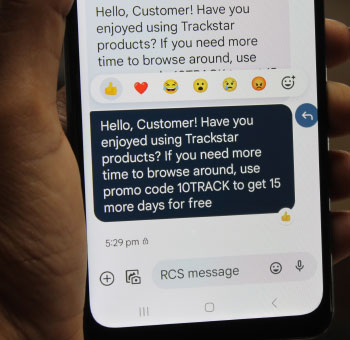Can I segment my customer database for targeted Bulk SMS marketing
Yes, you can and should segment your customer database for targeted Bulk SMS marketing. Segmentation allows you to divide your customer base into smaller groups based on specific criteria, such as demographics, behaviors, preferences, or purchase history. This enables you to send more relevant and personalized SMS messages to each segment, which can significantly improve the effectiveness of your Bulk SMS campaigns.
Here's how you can segment your customer database for targeted Bulk SMS marketing:
-
Collect Relevant Data:
To segment your customer database effectively, you need to collect relevant data about your customers. This can include information such as age, gender, location, interests, past purchase behavior, engagement history, and any other data points that are relevant to your business and marketing goals.
-
Categorize Customer Attributes:
Review the data you've collected and identify key customer attributes that can be used for segmentation. For example, you might categorize customers based on age groups, geographic location, product preferences, or customer loyalty levels.
-
Create Segmentation Criteria:
Based on the customer attributes identified in the previous step, create specific segmentation criteria. For example, you might have segments like "High-value customers," "Local customers," "Inactive customers," "New customers," etc.
-
Segmentation Tools:
Depending on the size of your customer database and the complexity of your segmentation criteria, you can use various tools to segment your data effectively. Customer relationship management (CRM) systems or marketing automation platforms often have built-in segmentation capabilities that allow you to create and manage different customer segments.
-
Define Segment-Specific Messages:
Once you have your segments, tailor your SMS messages to each group's characteristics and preferences. Customize the content, offers, and CTAs based on what resonates best with each segment.
-
Personalization:
Within each segment, you can further personalize your SMS messages by using merge tags or variables to address recipients by their first names or include personalized product recommendations, offers, or rewards based on their past behavior.
-
Test and Refine:
Conduct A/B tests with different messages for each segment to identify which approaches yield the best results. Continuously refine your segmentation strategy based on the data and insights you gather.
-
Automation and Scheduling:
Many Bulk SMS platforms offer automation and scheduling features, allowing you to send SMS messages to different segments at specific times or in response to specific triggers. Automation streamlines your campaign execution and ensures timely delivery.
-
Optimize Over Time:
Continuously analyze the performance of your SMS campaigns for each segment. Identify which segments are responding well and which need improvement. Use the insights gained to optimize your future Bulk SMS marketing efforts.
How do I ensure that my Bulk SMS marketing messages are delivered successfully
Ensuring that your Bulk SMS marketing messages are delivered successfully is crucial to the effectiveness of your campaigns. Here are several important factors and practices to consider to improve the delivery success rate of your Bulk SMS messages:
-
Use a Reliable Bulk SMS Provider:
Choose a reputable and reliable Bulk SMS service provider. Research and select a provider with a good track record of delivering messages promptly and reliably. Look for providers with strong network connections and delivery infrastructure.
-
Sender ID Configuration:
Configure an appropriate and recognizable sender ID for your messages. A sender ID is the name or phone number that appears as the sender of the SMS. A clear and trusted sender ID increases the chances of messages being delivered and read.
-
Clean and Updated Contact List:
Regularly clean and update your contact list to remove invalid or inactive phone numbers. This helps reduce the number of undeliverable messages and improves your overall delivery rate.
-
Verify and Format Numbers Correctly:
Ensure that all phone numbers in your contact list are correctly formatted, including the country code and area code. Incorrectly formatted numbers can lead to message delivery failures.
-
Avoid Spam Triggers:
Craft SMS messages that are not likely to trigger spam filters. Avoid using excessive capitalization, too many exclamation marks, or spammy keywords. Stay away from language that could be seen as misleading or deceptive.
-
Avoid Overloading:
Do not overload the Bulk SMS gateway with too many simultaneous messages. This can result in delays or delivery failures. Instead, schedule messages in batches to ensure successful delivery.
-
Optimal Timing:
Send your SMS messages at times when recipients are likely to be attentive and responsive. Avoid sending messages during late hours or very early in the morning.
-
Test Messages Before Sending:
Always send test messages to yourself and colleagues before launching a campaign. This allows you to check message formatting, sender ID, and delivery speed.
-

-
Maintain Good Sender Reputation:
Maintain a good sender reputation by delivering valuable and relevant content. High opt-out rates and frequent complaints can harm your sender reputation and affect delivery rates.
-
Monitor Delivery Reports:
Use the delivery reports provided by your Bulk SMS provider to monitor the status of your messages. Delivery reports indicate the delivery status of each message (e.g., delivered, failed, or pending).
-
Optimize for Different Carriers:
Different mobile carriers may have varying delivery mechanisms and policies. Optimize your messages to ensure compatibility across various carriers.
-
Keep Your Database Secure:
Protect your customer database from security breaches and unauthorized access. Ensure that your Bulk SMS provider has robust security measures in place to safeguard customer data.
-
Compliance with Regulations:
Adhere to SMS marketing regulations and obtain proper consent from recipients. Non-compliance with regulations can result in delivery issues and legal problems.
By following these practices, you can enhance the success of your Bulk SMS marketing messages and ensure that they reach your intended recipients in a timely and effective manner. Regularly analyze your delivery reports and metrics to identify any potential issues and make necessary adjustments to improve the overall delivery success rate.
What are the limitations of Bulk SMS marketing
Bulk SMS marketing, while a powerful and effective marketing channel, does have some limitations that marketers should be aware of. Here are the main limitations of Bulk SMS marketing:
-
Character Limitations:
SMS messages have a limited character count (typically 160 characters per message). This restricts the amount of information you can convey in a single message, making it challenging to deliver complex or lengthy content.
-
No Multimedia Support:
Unlike other messaging channels like MMS (Multimedia Messaging Service), Bulk SMS only supports plain text. You cannot include multimedia elements like images, videos, or audio files in your SMS messages.
-
Spam and Opt-Out Concerns:
Sending unsolicited SMS messages can lead to recipients viewing your messages as spam. High opt-out rates can also be a concern, as this can reduce the effectiveness of your marketing efforts.
-
Limited Interaction:
Unlike other marketing channels such as email or social media, SMS messages do not provide a direct way for recipients to interact with your content. Recipients can't click on links within the SMS message itself.
-
Mobile Number Availability:
You need a valid and up-to-date mobile phone number to reach your audience via Bulk SMS. If you don't have accurate contact information, your messages won't be delivered to the intended recipients.
-
Message Delivery Delays:
While Bulk SMS is generally fast, message delivery delays can occur due to issues with the mobile network or congestion in the SMS gateway. This can impact the timing and relevance of your messages.
-
Limited Targeting: While segmentation can help improve targeting, SMS messages are limited in terms of how well you can target specific audience demographics or interests compared to other digital marketing channels.
-
Readability and Attention: SMS messages have a limited screen size on mobile devices, and recipients might not always read the messages immediately or at all. Grabbing and retaining the recipient's attention is crucial for success.
-
Limited A/B Testing: Unlike other digital marketing channels, A/B testing options in Bulk SMS are more limited. It can be challenging to split test different elements of your messages to optimize their performance.
-
Potential for Misinterpretation: Due to the brevity of SMS messages, there's a higher risk of misinterpretation. Messages may lack context, leading recipients to misunderstand the intent or message content.
-
Dependency on Mobile Devices: Bulk SMS marketing relies on recipients having access to mobile phones and active phone numbers. If your target audience does not use mobile devices frequently, the effectiveness of your SMS campaigns may be limited.